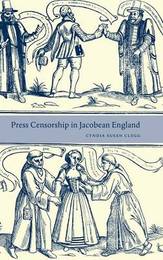
|
Press Censorship in Jacobean England
Hardback
Main Details
Description
This book examines the ways in which books were produced, read, and received during the reign of King James I. It challenges prevailing attitudes that press censorship in Jacobean England differed little from either the 'whole machinery of control' enacted by the Court of Star Chamber under Elizabeth or the draconian campaign implemented by Archbishop Laud, during the reign of Charles I. Cyndia Clegg, building on her earlier study Press Censorship in Elizabethan England, contends that although the principal mechanisms for controlling the press altered little between 1558 and 1603, the actual practice of censorship under King James I varied significantly from Elizabethan practice. The book combines historical analysis of documents with literary reading of censored texts and exposes the kinds of tensions that really mattered in Jacobean culture. It will be an invaluable resource for literary scholars and historians alike.
Author Biography
Cyndia Susan Clegg is Distinguished Professor of English Literature at Pepperdine University. She is the author of Press Censorship in Elizabethan England (Cambridge, 1997 0521573122) and The Peaceable and Prosperous Reign of Our Blessed Queene Elizabeth (2001).
Reviews'Press Censorship in Jacobean England is a valuable addition to the revisionist history of the Jacobean age, as well as to our understanding of the practice and mechanisms of early modern censorship.' Times Literary Supplement 'This is a scholarly and convincing essay, written from a sound grasp of the historical sources, and a good understanding of the dynamics of the reign.' Journal of Ecclesiastical History 'An excellent companion volume to Clegg's earlier study ... for the thoroughness of its scholarship, for the illuminating contribution it makes to our understanding of the complexity of early modern press censorship as well as for opening up new horizons in the historical and literary research on the Jacobean age in general and James I in particular, this is cultural history to savour.' English Studies
|